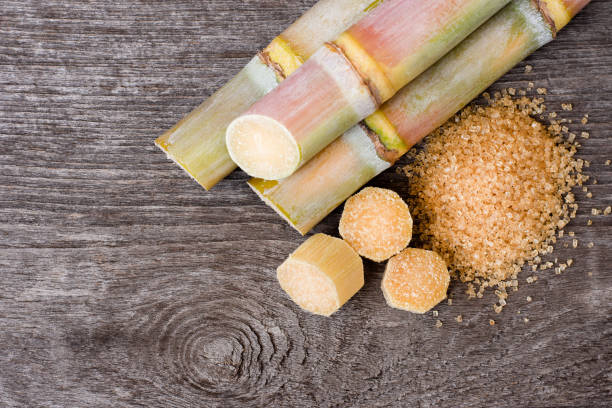How Sugar and Cane Are Processed for Use in Everyday Products
How Sugar and Cane Are Processed for Use in Everyday Products
Blog Article
Why Walking Stick Sugar Handling Chemicals Are Vital for Modern Sugar Refining
The function of walking cane sugar processing chemicals in contemporary sugar refining can not be overemphasized, as they are essential to boosting both the efficiency of extraction and the total quality of the last item. Agents such as phosphoric acid and certain flocculants are used to remove impurities, leading to sugar that not just fulfills consumer assumptions yet also adheres to market criteria. Nevertheless, the ramifications of these chemicals expand past quality, touching upon market characteristics and ecological considerations. This elevates vital questions about the sustainability of such methods and their influence on the future of sugar manufacturing.
Role of Handling Chemicals
The efficiency of walking cane sugar handling hinges dramatically on the critical application of handling chemicals. These chemicals play an essential duty in enhancing the effectiveness and quality of sugar extraction and refining. From the first stages of juice extraction to the final filtration actions, processing chemicals assist in various crucial operations.
In the removal stage, chemicals such as phosphoric acid and calcium hydroxide are used to enhance the clarification procedure, assisting to get rid of contaminations and put on hold solids from the cane juice. This not just enhances the return yet likewise ensures the quality of the final item. Additionally, representatives like flocculants aid in the quick settling of contaminations, thus enhancing the total procedure.
Triggered carbon and ion exchange materials serve to eliminate shade and smell, guaranteeing that the polished sugar fulfills consumer quality requirements. Hence, the precise choice and application of these chemicals are essential for attaining ideal results in walking cane sugar processing.
Key Sorts Of Chemicals
Walking cane sugar handling counts on a range of crucial chemicals that facilitate each phase of production. These chemicals play crucial roles in clearing up, whitening, and cleansing the sugar extracted from cane.
One main classification of chemicals consists of flocculants, such as polyacrylamide, which help in the clarification process by advertising the aggregation and settling of contaminations. In addition, calcium hydroxide is often employed to neutralize level of acidity and assist in the removal of non-sugar components.
Bleaching representatives, such as activated carbon and sulfur dioxide, are utilized to decolorize the syrup, leading to a clearer final product. These chemicals assist get rid of color compounds that may influence the sugar's appearance and bankability.
In addition, phosphoric acid works as a pH regulatory authority throughout the processing stages, making sure ideal conditions for the chemical activities entailed in sugar removal and filtration.
Various other vital representatives include edta (ethylenediaminetetraacetic acid), which chelates steel ions that might catalyze undesirable responses, and sodium hydroxide, which aids in pH control throughout the refining process. Collectively, these chemicals boost effectiveness and guarantee a top quality cane sugar item.
Benefits for Sugar Top Quality
Commonly neglected, the usage of details processing chemicals dramatically improves the total high quality of walking stick sugar. These chemicals play a crucial function in refining procedures, guaranteeing that the final item satisfies strict industry requirements for pureness and taste.

Furthermore, processing chemicals help in achieving a consistent granulation and appearance, which are vital for consumer acceptance. By controlling the crystallization procedure, these chemicals make certain that the sugar crystals create evenly, causing a much more appealing product that liquifies well in various applications.
In addition, using these chemicals can boost the shelf life of cane sugar by lessening dampness absorption and microbial growth. Generally, the calculated application of processing chemicals is essential for providing top quality walking cane sugar that meets consumer expectations and sector demands.
Environmental Impact Factors To Consider

Moreover, the energy-intensive nature of sugar refining, worsened by chemical use, frequently leads to enhanced carbon discharges. This adds to environment adjustment and elevates problems regarding the sustainability of existing refining methods. Furthermore, the sourcing of these chemicals might entail practices that endanger biodiversity, such as monoculture farming, which lowers the strength of farming ecological communities.

To mitigate these click site impacts, sugar refiners are increasingly exploring lasting options and embracing best practices that minimize chemical use. Carrying out extensive environmental monitoring systems can aid make sure that the refining process aligns with ecological requirements and promotes biodiversity. Ultimately, a well balanced technique that prioritizes both sugar top quality and ecological stewardship is important for the long-lasting stability of the sugar market.
Future Trends in Refining
As the sugar sector comes to grips with the environmental challenges related to standard refining methods, cutting-edge methods are arising to improve both efficiency and sustainability. One substantial trend is the fostering of green chemistry principles, which focus on making use of safe, biodegradable handling chemicals. This shift not just reduces ecological impact yet additionally addresses consumer need for cleaner production methods.
Another encouraging advancement is the execution of sophisticated purification technologies, such as membrane splitting up and adsorption processes. These strategies improve the clearness and quality of the sugar while decreasing the quantity of wastewater generated during refining. In addition, the integration of electronic innovations, consisting of IoT and AI, is changing operational effectiveness by making it possible for real-time monitoring and anticipating upkeep, thus reducing resource waste.
Additionally, making use of byproducts from sugar refining, such as bagasse and molasses, is gaining traction. These materials can be transformed right into biofuels or value-added products, adding to a circular economic situation within the sector. Jointly, these fads signal a shift towards more lasting practices that not just boost operational efficiency but additionally straighten with global sustainability objectives, ensuring the future stability of sugar refining.
Verdict
Walking cane sugar handling chemicals are important in modern sugar refining, dramatically enhancing the efficiency and quality of sugar extraction. The tactical use these chemicals not just enhances the purity and flavor of the final product yet likewise makes certain regular formation and appearance. As the market progressively prioritizes sustainability, the adoption of environmentally-friendly processing representatives is most likely to shape future trends in refining, inevitably causing higher quality items and expanded life span for consumers.

Eventually, a well balanced approach that prioritizes both sugar high quality and ecological stewardship is essential for the long-lasting feasibility of the sugar sector.
Walking cane sugar processing chemicals are essential in modern-day sugar refining, significantly improving the performance and top quality of sugar extraction.
Report this page